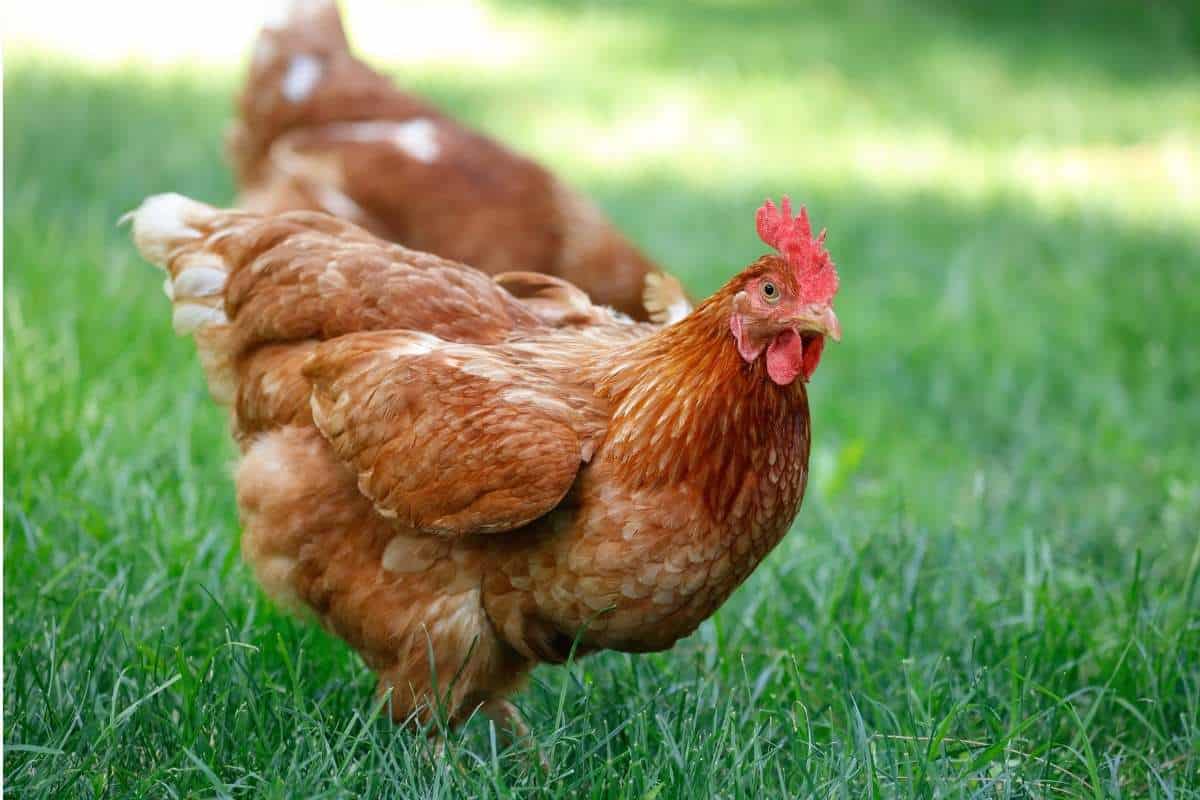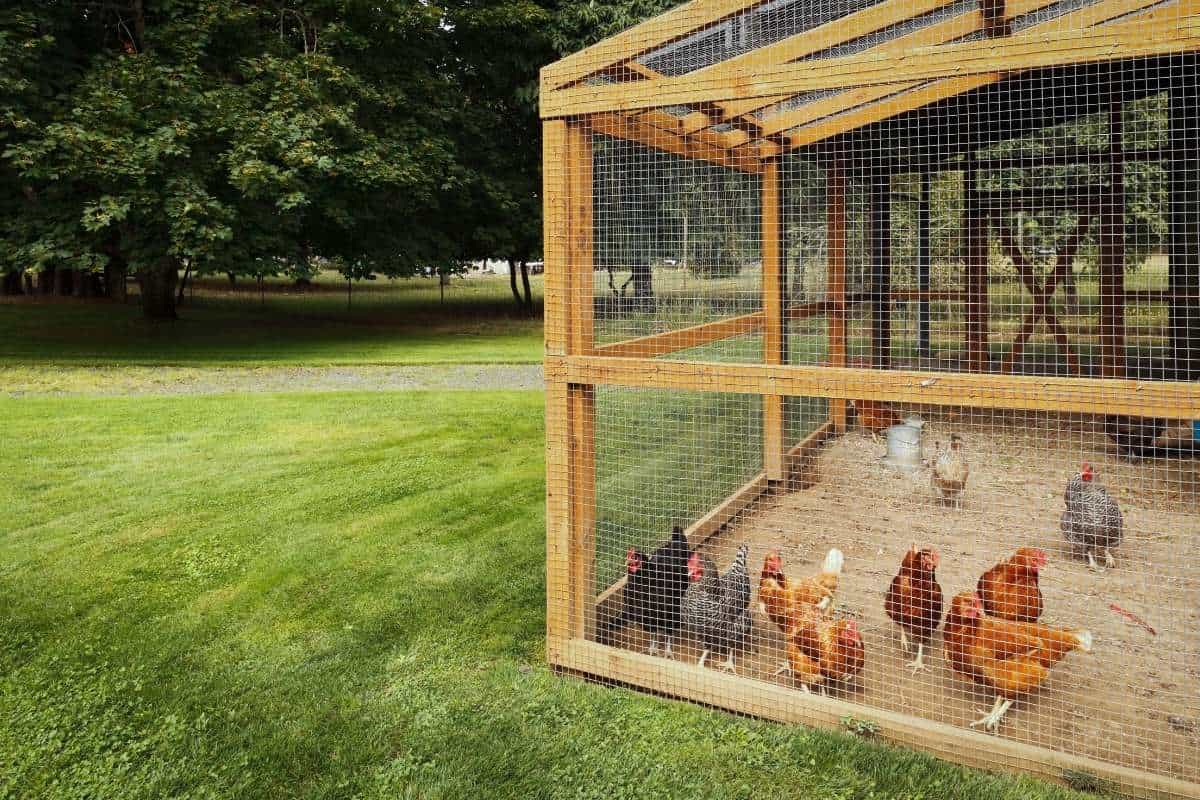The Pros and Cons of Free-Range Chickens: Are They Right For Your Backyard?
Everyone would rather be free instead of cooped up, and chickens are no different. But there are pros and cons of free change chickens.

The advantages and disadvantages of free-range chickens:
Free-range chickens save you money, give you delicious eggs, and are happy. But although the advantages are many, they are legitimate reasons that free-ranging doesn’t work for everyone.
What does free ranging mean anyway?
Free-range chickens can roam around without being cooped up in a small space. It simply means that the door to their chicken coop is open, and they can come and go as they please.
(They will naturally return at dusk, and their door should always be closed at dark.)
The good things about free-ranging your backyard chickens
Tastier eggs: You’ll find that free-rangers naturally will produce more flavorful eggs. Adding fresh greens and bugs into their diet dramatically improves egg flavor. You’ll find that free-range eggs have darker, more orange yolks. The flavor difference is one of the reasons that free-range eggs cost more at the grocery store.
Pest control in your yard: It’s a fact that free-range chickens will eat many, many bugs in your yard. They’ll do an excellent job at getting rid of pests like grasshoppers, caterpillars, and other creepy crawlies in your garden. We notice that they control ticks and have even witnessed them eating small snakes.
Beautiful and satisfying to watch: Seeing chickens free-range throughout your yard is one of the most beautiful sights in the world. If you’re the type who has dreamed of having a homestead of your own, seeing them scratch and pack while you watch feels like the culmination of all your dreams. And if you think that’s not important, you’re wrong.
A more balanced diet: Free-range chickens will eat more than just bugs. They will find greens, berries, and other natural items as they explore your yard. They will eat small rocks to help with digestion and will need fewer supplements from you. The variety of nibbles ensures that they can get all of the nutrients they need from various sources.
You’ll save money on chicken feed: Free-range chickens will still eat layer feed, but they can also find a lot of their own food in your yard. So the more free-range you allow them to be, the less money you’ll spend on feed. You can also supplement their diet with table scraps.
Happy birds: These birds will be much more comfortable and healthier if free-range. Chickens love the freedom to chase things, run around, roost on fences, and get some space from each other. Free-ranging chickens do not have any problems with pecking each other, getting in fights, and other lousy chicken behavior resulting from being in the coop all the time.
Healthier chickens: When chickens are free-range, they get a better balance of vitamins and nutrients out of their diet. Better nutrition results in more robust immune systems to fight illness and disease. They can take a dust bath as needed. Simply having more space and fresh air will help them too. No one wants to live in a small room full of chicken poop.
Cleaner chicken coop: It stays cleaner if they’re spending less time in the coop. Free-ranging chickens will still sleep in there, but in general, you’ll be able to go longer without cleaning the coop.
Allows you to have a smaller coop: Another way free-ranging chickens save you money is to have a smaller pen. We have thirty chickens in an 8 x 6 area, and they are happy as can be because they only go there to sleep and lay eggs.

Cons of free-range chickens
Chickens poop everywhere: A downside is that chickens will poop everywhere. Your yard will look like a minefield of chicken droppings. Even if you do not mind the sight, many people cannot stand to navigate their yards as they do not want to step in it or get it in their shoes. Unless you discourage them, they will wander onto your porch, your deck, and everywhere else. They don’t just stay near the coop.
Predator attacks: This is a big one and what holds most people back from having free-range chickens. It can seem scary out there with hawks, eagles, foxes, dogs, and other hungry animals watching your free-range chickens. You have to come to terms with the fact that you will lose some. If you can’t handle that, free-ranging chickens are not for you.
Destruction of garden and flower beds: Chickens will eat anything, not just unwanted plants and bugs. They’ll devour your flower seedlings, your newly ripe tomatoes, the corn you just planted, and peck holes in your pumpkins. The destruction can be infuriating, as you can well imagine.
Rooster problems: A free-ranging rooster comes with its own set of issues. Any aggression will be out in the open on full display, and roosters will often charge or even attack people, especially children. You’ll have to witness their mating attempts as well.
Hens will lay eggs outside: Sometimes, laying hens will start laying outside their nest boxes, which is very annoying. Errant egg-laying is not common, but it does happen. Unless you relish the thought of going on an Easter egg hunt to collect eggs, you’ll definitely see this as a significant disadvantage of the free-range method.
You must remember to open and close the door. Unless you have an automatic door, you will need to open the door in the morning and (more importantly) close it at night. If you are gone during dusk, this can pose a problem. It can be stressful to remember to close the coop up every night and constantly worry that you’ve forgotten
Related: How to Pick the Right Chicken Varieties for Colored Eggs
Finding what’s right for you
So, what’s best? Well, it depends on your situation.
In my personal opinion, all chickens benefit from a little free-ranging time. It’s good for them, fun for you, and gives you better eggs.
Keep in mind it doesn’t have to be an all-or-nothing thing.
Tips for successful free range chickens
- Fence your vegetable garden. Complete chicken proofing is impossible, but a fence will help.
- White chickens do the worst as free rangers because they are the most visible
- Train your chickens to come when called. (This simply involves giving them a treat like chicken scratch while calling for them. I use a red cup and say “chickens”, then give them the scratch. Once they’re mastered this, you can get them in the coop when necessary, like if you need to go out that evening.)
- Keep them in the coop full time for a few weeks as young hens. This will train them to lay in egg in their nest boxes.
- Don’t allow baby chicks to free range. They’ll be easily picked off by anything.
- Free range chickens will be safer if they have a wooded area to hide from hawks, but being along the edge of the woods can also allow foxes to snatch them easier.
Overcoming obstactles
If you’re uncomfortable with the idea of totally free birds, perhaps you could let them out a few hours before sunset and allow them to free-range while you watch before they return at dusk.
You can let them free range part-time: perhaps only the gardening off-season, or only in the summer when the flies are bad in the coop.
If you have problems with dogs, remember that your neighbors do not have the right to allow their animals to attack yours. You are perfectly within your rights to call Animal Control if dogs are harassing your free-range chickens.
Lots of birds of prey? The common black hawk tends to leave chickens alone. Red-tail hawks can be a problem, as can bald eagles. But these birds are less common than the “typical” black hawk you see circling the sky, which tends to be after rodents and other small critters.
What if I am just too nervous to let them out?
Raising chickens is personal, and there are many ways to do it right. If free-range chickens aren’t for you, there are alternatives.
- Give your chickens a large outdoor run. This is expensive to build, but it helps them have lots of fresh air and freedom while staying safe.
- Try a chicken tractor! This is basically a portable run that you move from spot to spot. It allows your chickens to eat grass but keeps them contained where you. want them.
So how do I start with free range chickens?
This one’s easy. Open the door. Prop it open. Let them do their thing. Close it at night. They will come back on their own before dark. Promise.
If it goes well, let them out more.
If it makes you nervous or you start losing too many chickens, let them free range less.
Find the middle ground that works for you.
There are many advantages to free-range chickens roaming freely. Free-range chickens have a lot more space to roam around and forage for food on their own. The room is beneficial because it allows them to get some exercise and a bit of freedom while still being safe from predators. But if you’re not careful, free-range chickens can become a nuisance in your yard or neighborhood. Still, there are also some disadvantages that you should consider before deciding whether or not you want them to roam around your backyard.
Love,











I have a smaller area when I can’t watch them and I free range them when I can they are much happier and although I have lost a few over the years quite a few actually I feel that days free picking and scratching being a chicken a year of Life of that is much better than 5 years in a little wire box. I love nothing more than to watch my chickens be chickens😁
I had 4 hens disappear within 30 minutes . The only explanation were the black vultures in the area.